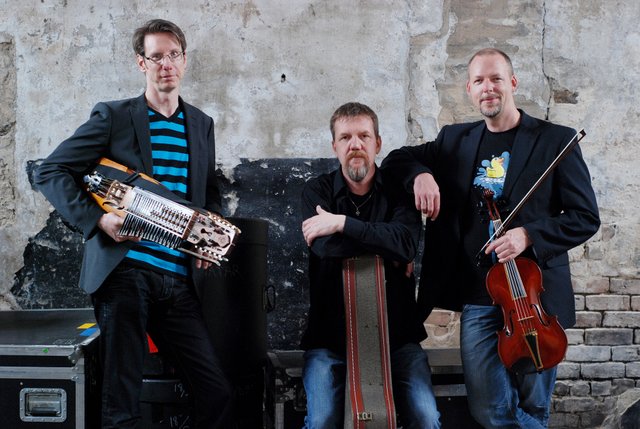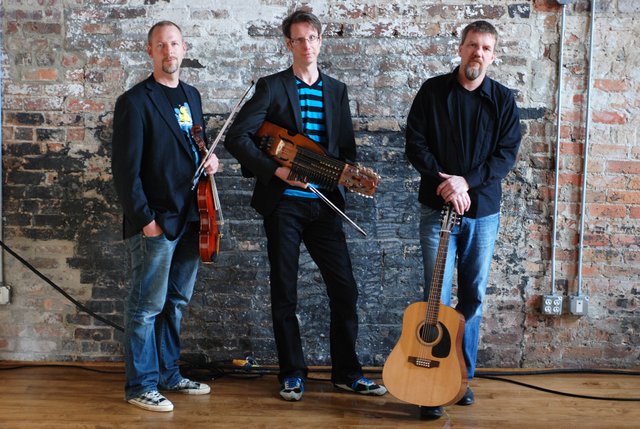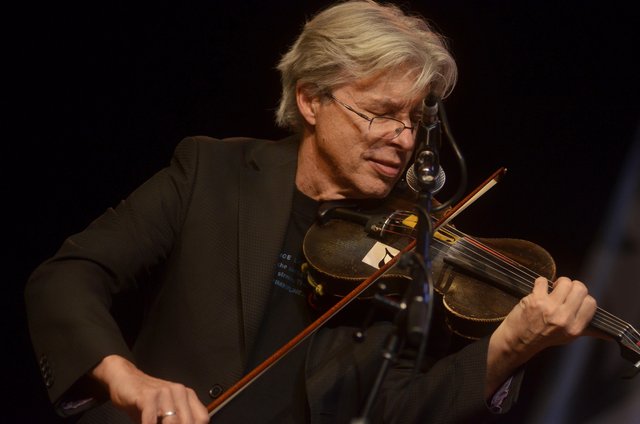Vallecito, CA…Twisted Oak Winery is pleased to announce the next concert of our 2015 Twisted Folk Concert Series – featuring Väsen, one of Sweden’s most prominent, critically-acclaimed acoustic instrumental ensembles – with special guest, fiddle legend Darol Anger (David Grisman Quintet, Turtle Island String Quartet, Montreux Band, Psychograss). An easy dinner (easy because you don’t have to cook) will be available for purchase (with a vegetarian option available), along with yummy Twisted Oak wine, brownies, popcorn, and soft drinks. Concertgoers are welcome to bring their own picnics but we ask that no outside alcoholic beverages be brought in.
Seating at Twisted Folk concerts is outdoor festival style, first-come, first-served – bring a low beach-type chair or a blanket. We’re on top of a hill and there is always an evening breeze – it can get a little chilly after dark so please plan ahead.
Twisted Oak Winery is located in the foothills of Calaveras County, and specializes in wines made from Mediterranean varieties like Tempranillo, Viognier, and Petite Sirah. We’re also known for being the home of the world-famous “Rubber Chicken National Forest.” Our concert venue, located at the winery in Vallecito, sits on a hilltop that commands a sweeping view of the Sierra Nevada and the surrounding foothills, presided over by a 350-year old California Blue Oak that graces the label of every wine we bottle.
“Back in 2006, I was asked by mandolinist Mike Marshall to design a CD package for an upcoming recording project between Mike, violinist Darol Anger and this Swedish band, Väsen,” said Twisted Oak’s talent buyer, Maria Camillo, who is also the band’s US representative. “I’d heard of them prior to this, through Mike and Darol, but I’d never seen the band live, or heard any of their recordings. Mike and Darol were first introduced to Väsen via their good friend, and well-known old-time musician, Bruce Molsky, gathered them together to listen to a Väsen cd, and said, ‘You need to hear these guys, but you better sit down first.’ They were immediately blown away.
“Ultimately, after meeting and performing together for the first time at a world music festival, they became great friends, and decided to record together. After that CD was released, I finally had a chance to see Väsen perform in Santa Cruz at the Kuumbwa Jazz Center. I remember sitting in the back row, and being completely amazed by their sound. How could three acoustic instruments have that much presence and power? I’d never heard anything like it. I knew they were going to be good, but I wasn’t prepared for HOW good, or how funny and charming they’d be on stage.
“A week later, I saw them perform with Mike and Darol at the Sebastopol Celtic Music Festival. It had been a long time since a live performance knocked my socks off like that. The five of them together were so incredibly dynamic. It was like seeing New Grass Revival for the first time. Jaw-dropping. In fact, one could say that what New Grass Revival is to bluegrass, Väsen is to traditional Scandinavian folk music. They simply take it to a higher level. Soon after this, I got a call from Olov Johansson, Väsen’s nyckelharpa player, and he asked if I would like to be their US booking agent. I said yes right away. Didn’t even have to think about it. We’ve been working together ever since.”
Partly due to their collaboration with Mike Marshall and Darol Anger, Väsen has now performed at countless music festivals from coast to coast. “I first booked them at Wintergrass, in Washington state,” said Maria. “It was in an off-site location in a church, and it was packed to the rafters. It is probably safe to say that almost no one in attendance had seen the band before, nor knew what to expect, exactly. Who were these three tall guys with that strange instrument? After they played their first tune, I will never forget this, the crowd erupted into deafening applause, and a spontaneous standing ovation. After the first tune! That’s something you don’t see very often. I knew then, that if they could win over this bluegrass crowd, they could play anywhere, and people would love them.”
They went on to perform at many other prestigious festivals, including RockyGrass, Telluride, the Live Oak Music Festival, Vancouver, Calgary, Savannah Music Festival, and many others. The devoted fans at the Lotus World Music Festival in Bloomington, Indiana, loved them so much, they formed a committee called “Team Väsen” and petitioned the mayor to name a street after them. The Wintergrass festival has booked them again for 2016. It will be their fifth appearance there.
It was at Wintergrass where they met Chris Thile and the Punch Brothers. So impressed were Chris and his bandmates, they invited Väsen to sit in with them for a few tunes at Telluride the next year. The Punch Brothers later recorded one of Väsen’s tunes (Flippen). Chris Thile and Väsen both happened to be invited to be guests on A Prairie Home Companion on the same night, and performed Flippen as the grand finale. There is a video of this on YouTube.
Väsen
– by Amelia Mason, The ARTery, Somerville, MA (used with permission)
Swedish folk music evolved out of music for dancers in the courts and later in the countryside, where villagers gathered on icy winter nights and in the long, eerie twilight of Swedish summer. It has a lilting, dynamic quality reminiscent of Celtic music and a propulsive energy akin to the barndance-driven sounds of Appalachia. But Swedish tunes, unlike their brethren to the west, are often written in time signatures based in phrases of three, lending them unusual buoyancy; players—generally fiddlers—stretch and contract these rhythms for a suspenseful, slightly off-balance feel. Tunes range from the furious and notey to the measured and stately, but like the whirling couple dances to which they owe their form, all share a sense of perpetual movement, of the centrifugal force generated by two bodies in motion.
Olov Johansson (nyckelharpa), Mikael Marin (5-string viola) and Roger Tallroth (12-string guitar) seem to possess an almost telepathic connection. In their capable hands, Sweden’s native music is delivered with both ecstatic freedom and stunning precision. Certain music lives in the interplay between like minds, and it is a rare group of musicians who can harness its full potential.
But what really sets Väsen apart is Tallroth’s guitar work. Guitar entered the Swedish folk vernacular relatively recently, and Tallroth has always stood out for his groove-oriented, pop-inflected approach. He plays a 12-string guitar (each string is doubled) and uses a deep, open tuning that lends his playing an expansive quality. Tallroth has an ear for the dramatic offset by a proclivity for the quirky, favoring odd phrasing and unconventional chord progressions. “He built his taste for harmonies listening to bands like the Beatles, I think,” remarks Johansson.
“When Roger started to play his guitar, adding bass lines and second voices and counter-rhythms and stuff—he was one of the first explorers, you could say, of that way of doing it,” Johansson explains. “And now he has created a school in how to make accompaniment on guitar to traditional music in Sweden. … He has been very important.”
The members of Väsen are prolific tune-writers, and one of the group’s greatest strengths lies in its material. Johansson, Marin and Tallroth have a taste for uplifting hooks and built-in dynamics, but they write with the same melodic exquisiteness and idiosyncrasy particular to Swedish folk music. This has earned the band a devoted following among American string players across a vast musical spectrum. In 2007, Väsen recorded an album with mandolinist Mike Marshall and fiddler Darol Anger—two legends of modern bluegrass music—which garnered the band legions of bluegrass fans and landed them at unlikely festivals like the popular Wintergrass in Bellevue, Washington.
Like so many folk bands, Väsen by necessity must navigate the murky territory between what is considered “traditional” and what is “new.” Johansson estimates that about 80 percent of the band’s concert set is original, but he points out that the practitioners of traditional music have always been the makers of their own material: “All the people we learned from, they did compose. So it was not strange to make your own tunes.”
It is in live performance that Väsen is most brilliantly illuminated. The trio stands clustered together, heads bent intently, bodies swaying. Johansson, with his glasses and lanky frame, resembles a tall, Nordic Harry Potter, positioned between the bearded Tallroth and the black-clad Marin. No matter how large the audience, the group sounds not so much like they are onstage as at a loose, late-night jam session—albeit a particularly virtuosic one. It’s like walking into the coatroom at a house party and discovering the musicians’ secret sanctuary. With each bow stroke and every strum, Väsen ushers the audience into that rarefied world, where the tunes churn endlessly through the night, and the breaking dawn is only an affirmation that this has been happening for ages, and will happen for ages to come.
Darol Anger
Fiddler, composer, producer and educator, Darol Anger is at home in a number of musical genres, some of which he helped to invent. Exceptional among modern fiddlers for his versatility and depth, Anger has helped drive the evolution of the contemporary string band through his involvement with numerous path-breaking ensembles such as his Republic Of Strings, the Turtle Island String Quartet, the David Grisman Quintet, Montreux, his Duo with Mike Marshall, and others.
He has performed and taught all over the world with musicians such as Dr. Billy Taylor, Bela Fleck, Bill Evans, Edgar Meyer, Bill Frisell, David Grisman, Tony Rice, Tim O’Brien, Väsen, The Anonymous 4, Marin Alsop and the Cabrillo Orchestra, the Detroit Symphony, Mark O’Connor, and Stephane Grappelli.
Today Darol can be heard on NPR’s “Car Talk” theme every week, along with Earl Scruggs, David Grisman and Tony Rice. He was also the violinist on the phenomenally popular Sim City computer games.
In addition to performing all over the world, he has recorded and produced scores of important recordings since 1977, is a MacDowell and UCross Fellow, and has received numerous composers’ residencies and grants. He has been a featured soloist on dozens of recordings and motion picture soundtracks.
He is an Associate Professor at the Berklee School of music. He recently began an ambitious online Fiddle School at ArtistWorks.com. His website is www.darolanger.com





